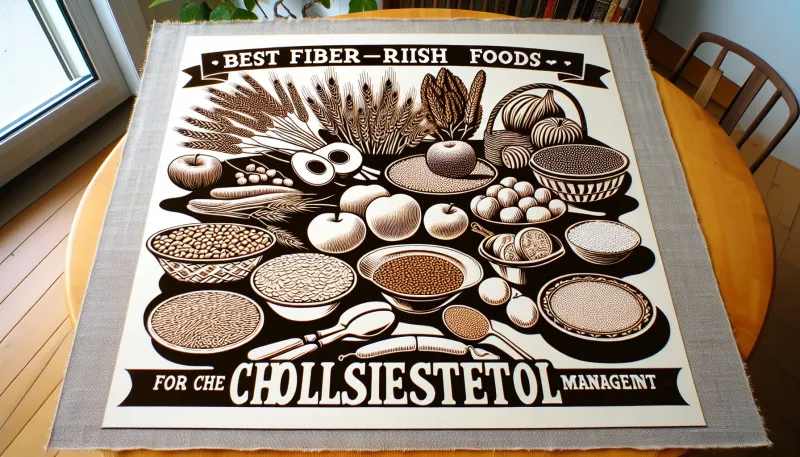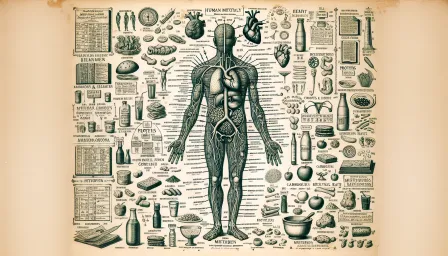Best Fiber-Rich Foods for Cholesterol Management

Discover the best fiber-rich foods to help manage cholesterol levels effectively. Learn how incorporating high-fiber foods into your diet can improve heart health.
Managing cholesterol levels is crucial for maintaining heart health and overall well-being. One effective strategy to control cholesterol is incorporating fiber-rich foods into your diet. This article will provide you with a comprehensive guide to the best fiber-rich foods for cholesterol management, ensuring that you can make informed dietary choices for a healthier life.
Understanding Cholesterol and Fiber
Cholesterol is a fatty substance produced by the liver and found in certain foods. While the body needs cholesterol to build cells and produce hormones, excessive amounts of low-density lipoprotein (LDL) cholesterol can lead to plaque formation in the arteries, increasing the risk of heart disease and stroke.
Dietary fiber, particularly soluble fiber, plays a key role in lowering LDL cholesterol levels. Soluble fiber dissolves in water to form a gel-like substance that binds to cholesterol in the digestive system, facilitating its removal from the body.
Top Fiber-Rich Foods for Cholesterol Management
1. Oats and Barley
Oats and barley are excellent sources of beta-glucan, a type of soluble fiber that effectively lowers LDL cholesterol. Consuming a bowl of oatmeal or adding barley to soups and stews can significantly benefit your cholesterol levels.
2. Legumes
Legumes, including beans, lentils, and peas, are not only rich in fiber but also packed with protein and essential nutrients. Incorporating legumes into your meals can improve heart health and keep your cholesterol in check.
3. Fruits
Fruits such as apples, oranges, strawberries, and grapes are high in soluble fiber. Pectin, a type of soluble fiber found in fruit, has been shown to lower cholesterol. Aim to include a variety of fruits in your daily diet for optimal benefits.
4. Vegetables
Vegetables like carrots, Brussels sprouts, and broccoli are excellent sources of fiber. They are low in calories and high in essential vitamins and minerals, making them an important part of a cholesterol-lowering diet.
5. Nuts and Seeds
Nuts and seeds, especially almonds, walnuts, flaxseeds, and chia seeds, provide a good dose of soluble fiber. Additionally, they are rich in healthy fats, which can help improve cholesterol levels when consumed in moderation.
6. Whole Grains
Whole grains, such as brown rice, quinoa, and whole wheat, are packed with fiber. Replacing refined grains with whole grains can significantly enhance your fiber intake and support cholesterol management.
Incorporating Fiber-Rich Foods into Your Diet
Start Your Day with Fiber
Begin your day with a high-fiber breakfast by choosing oats, whole-grain cereals, or fruit smoothies. This can set a positive tone for the rest of your meals.
Add Legumes to Your Meals
Incorporate legumes into soups, stews, salads, and main dishes. They are versatile and can be included in various recipes.
Snack on Fruits and Nuts
Opt for fruits and nuts as snacks instead of processed options. This not only increases your fiber intake but also provides necessary nutrients.
Increase Vegetable Intake
Ensure that each meal includes a portion of vegetables. Experiment with different cooking methods, such as steaming, roasting, or sautéing, to keep your meals interesting.
Choose Whole Grains
Substitute refined grains with whole grains in your diet. Simple swaps like choosing brown rice over white rice or whole wheat bread over white bread can make a significant difference.
Conclusion
Managing cholesterol levels is vital for maintaining heart health, and incorporating fiber-rich foods into your diet is a proven strategy. Foods like oats, barley, legumes, fruits, vegetables, nuts, seeds, and whole grains are rich in soluble fiber, which helps in lowering LDL cholesterol. By making conscious and informed dietary choices, you can effectively manage your cholesterol levels and promote overall well-being.
Remember to consult with a healthcare professional or a registered dietitian before making any significant changes to your diet, especially if you have existing health conditions or concerns.



























